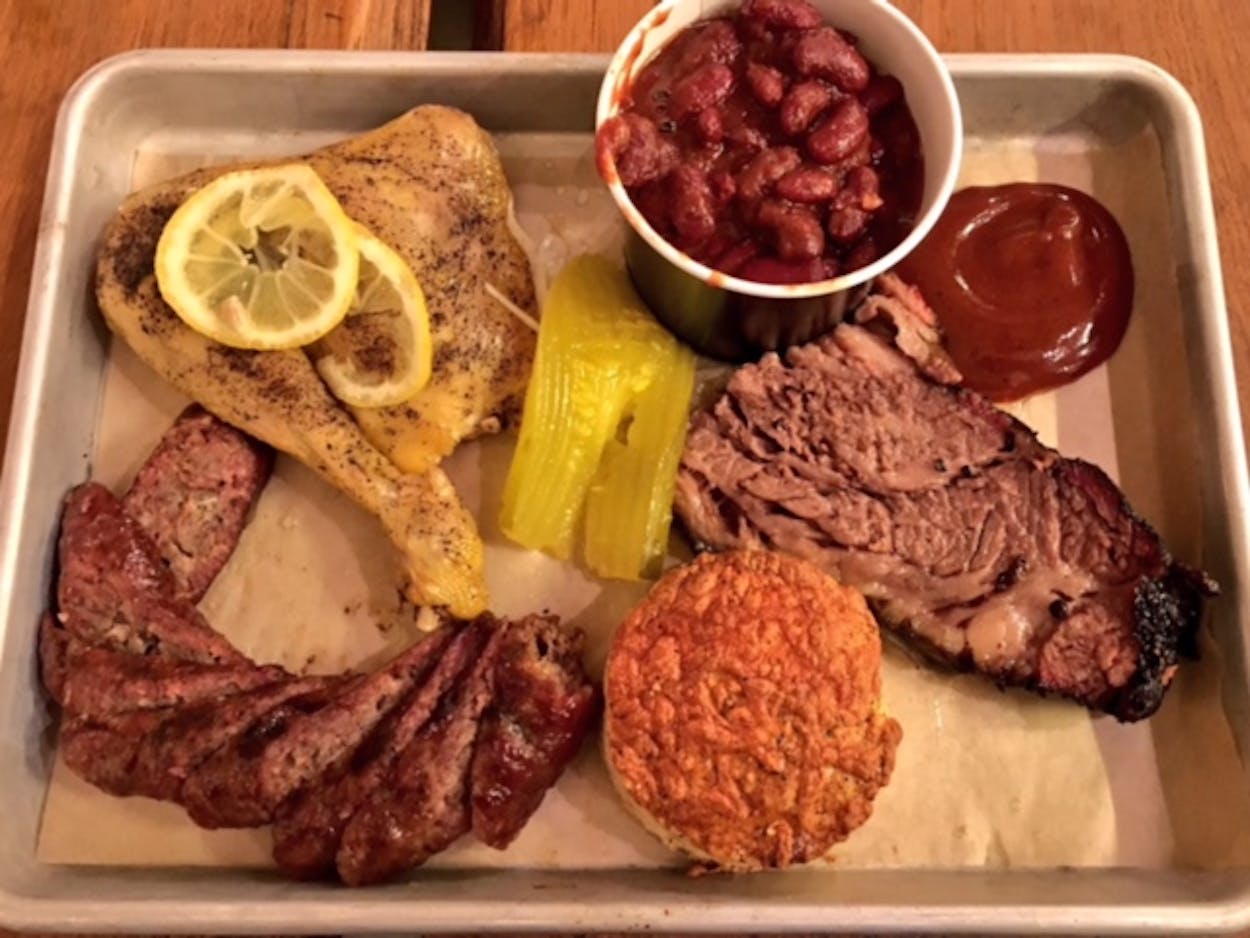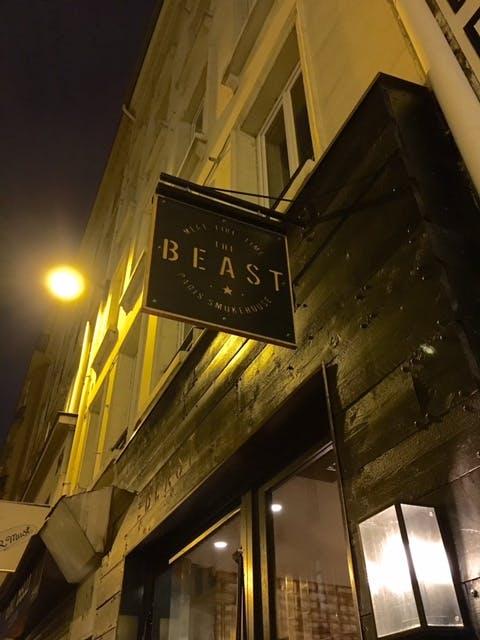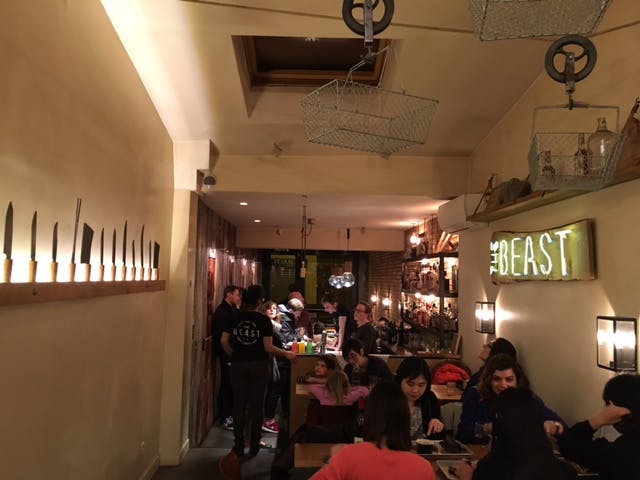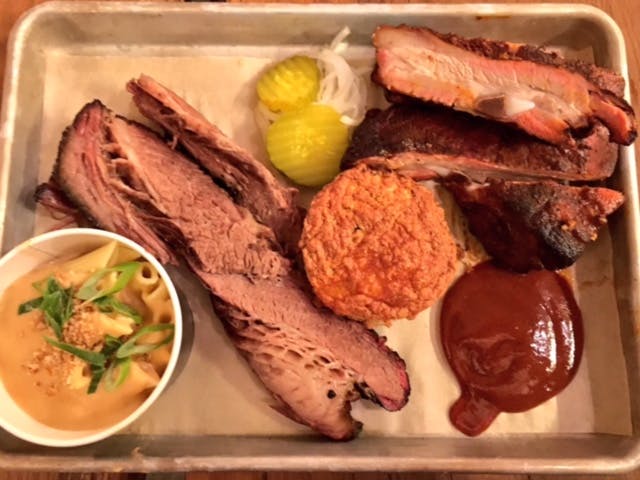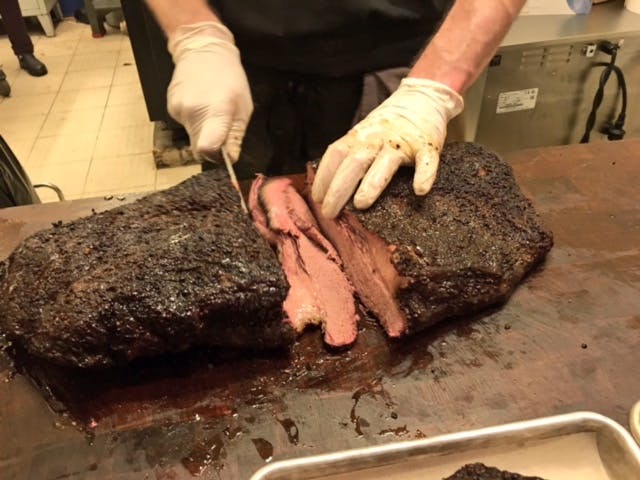A barbecue joint in Paris, France? The notion sounded odd a couple of years ago when I first met Thomas Abramowicz, owner of the Beast. But the shock has worn off, and it seems I’m the last barbecue hound to visit. After so many words and photos from the likes of the New York Times, the Washington Post, the Houston Chronicle, and even an Austin blogger about this unlikely beacon of Texas culture in Paris, it felt like I’d already been. Still, that didn’t mean I was going to pass up a chance to see how French oak mixes with American beef while in France.
The Beast isn’t the first or the newest Texas-style barbecue joint in Paris. Blues Bar-B-Q was opened by Dallas native Diana Darrah in 2010. Another named Flesh opened last year. And maybe there’s a budding pitmaster searching for a brisket supplier in the seventh arrondissement at this very moment, but I wasn’t looking for the hidden newcomer. I was on vacation with my family. So we took a brief break from frites and foie gras to seek out beef ribs in the historic Marais district.
Neighborhood bars were filling up as we walked from the Metro’s Arts et Métiers station. It was already late for my four and six-year-old, but still early for a Parisian dinner. Most restaurants reopen around seven in the evening, and the Beast is no different. Like most of the restaurants where we had dinner, we were the only group with children. So, with kids in tow, we headed to dinner before eight o’clock, doubling down on our American-ness. Not to mention the Texas barbecue part.
I observed a few commonalities over eight days and roughly sixteen restaurant meals in the City of Lights. Paris restaurants are quiet, and manners are paramount. People do not eat with their hands: A knife and fork comes out even for burgers and fries. Bread is omnipresent, but is usually a sliced baguette. Pickles are served with every charcuterie plate, but always cornichons. There’s also no such thing as iced tea, much to the dismay of my son—who, in his desperation, took to ordering hot tea until discovering it was a poor replacement no matter how much sugar was added.
Happily, the Beast broke all of these rules. I felt at home here, and it wasn’t just the menu (the wall of bourbon behind the bar didn’t hurt). It’s like an oasis not just from French food, but from French dining. But, just in case you need to be reminded you’re still in Paris, the Beast accomplishes this all in a space roughly the width of a king-size mattress.
Abramowicz has imported the recipes for sure, but he’s also brought over the feel of an American barbecue joint. Communal tables make it a bit cozy. The kitchen is open with the imported J&R smoker on display behind the cutting block. The place smells of meat and smoke, and it’s comfortingly loud. The smoked meat menu is certifiably Texan with its beef ribs and brisket, and a Fort Worth native wouldn’t raise an eyebrow at the side options. In fact, that was the part of the menu Abramowicz felt most hamstrung by while he was still in the planning stages in 2014. Parisians expect lighter fare, so he was thinking of salads and steamed broccoli. “I’ll have to make fries too,” he told me then. Two years later there are no fries, and the broccoli has given way to the familiar creamy slaw and a very good rendition of barbecue beans. Mashed potatoes and gravy stand in for potato salad. There’s also “mac & cheese” made with an English cheddar cheese sauce that’s poured over the pasta just before serving. The braised kale “greens” (with brisket) and a garnish of onions and real dill pickles are about the only thing light on the menu.
Every item here is homemade, right down to the cheese-topped biscuits, which were the only ones I spotted in Paris. Although canned beans and Reser’s potato salad from a tub are commonplace in Texas, that sort of “cooking” won’t suffice in France. “You have to be transparent,” Abramowicz told me during dinner. That means developing original recipes, sourcing ingredients thoughtfully, and being open about where your meat and produce comes from. For the Beast, that means American beef brisket. French beef is what we know as grass-fed beef, and it’s very lean. They also aren’t boxing up briskets like we do here in the U.S., so that means importing from Creekstone in southern Kansas. The beef ribs come from the opposite side of the world in Australia, so if you want to eat local here, stick with the chicken and pork.
When I spoke to Abramowicz in 2014, he said he focused immediately on Texas fare because it “is the most meat-focused school of barbecue.” The influence is clear in his bevy of protein options. The aforementioned beef rib is a peppery standout. A one pound chunk of meat on the bone is something to behold anywhere, but it’s especially abnormal in France, where a côte de bœuf (ribeye) for two would be considered a modest meal for one at an American steakhouse. But Abramowicz differs from his mentor Wayne Mueller’s technique. The beef isn’t cooked to the point of falling apart, and instead, razor-sharp folding knives are on the table to cut slices of the tender meat. The beef also tastes a bit grassier and, well, beefy than the American brisket, which any Texan would immediately recognize. Still, it’s juicy, tender, smoky, and just simply great barbecue.
The beef sausage, an in-house attempt to replicate versions from Central Texas, is an admirable effort, but still needs some work. The long leg on the chicken quarter gave it away as a leaner French bird, but my wife (who is now better informed on Parisian chicken than I’ll ever be) called it the best in town. My daughter couldn’t help but bury her head into the generously stuffed pulled pork sandwich, and my son polished off the ribs on his own.
OK, I did sneak a bite. They’re thicker than an American rib, with some of the belly still attached. The flavor of the pork rises above smoke or seasoning, and they’re pleasantly juicy. At the end of the meal, Abramowicz asked for honest criticism, and there were far less comments to offer than I’d expected. It was a sincere and worthy homage to his Texas mentors.
There’s a theory that the term barbecue came from the French barbe à queue, meaning “beard to tail.” I find that origin story hard to believe, since we’d probably be eating ribs with knives and forks if that were the case—and when I offered this to Abramowicz, he admitted he’d never heard that. But even if the French didn’t create barbecue, they sure catch on fast.
The Beast
27 Rue Meslay, 75003
Paris, France


